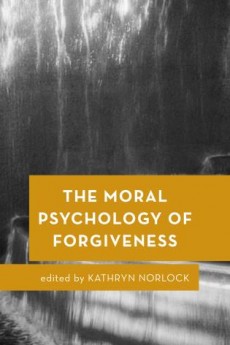BOOKS
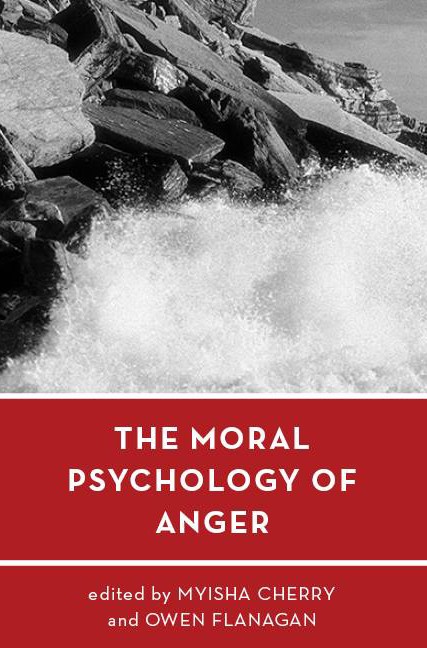 Myisha Cherry and Owen Flannigan (eds). The Moral Psychology of Anger. Rowman and Littlefied. (Forthcoming, Jan. 2018). More Info
Myisha Cherry and Owen Flannigan (eds). The Moral Psychology of Anger. Rowman and Littlefied. (Forthcoming, Jan. 2018). More Info
Anger is a universal personal, social, and political emotion. It is bewildering in certain ways. It seems natural and necessary but it also unpleasant and disruptive. Every culture endorses norms that regulate expressions of anger, sometimes even feelings of anger. Aristotle thought that anger was sometimes justified, as well as sometimes useful. Seneca, the Stoic, and Shantideva, the Buddhist sage, thought anger the worst emotion, and that it should be eliminated (if possible). These issues are alive today and embedded in sophisticated discussions of the nature and function of emotions, the difference between an emotion that is a biological adaptation and one that conduces to flourishing, social progress, and, in the case of anger, its specific role in struggles for racial and gender justice. A systematic discussion of the nature, function, and proper norms of anger is in order. The Moral Psychology of Anger is the first volume to do this and contains papers that defend anger as necessary for psychological and social health and well-being to papers that argue that it is the most destructive emotion and worth eliminating.
JOURNAL ARTICLES
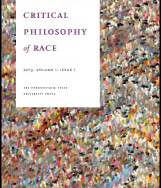 Botts, Tina F. ; Bright, Liam K. ; Cherry, Myisha ; Mallarangeng, Guntur & Spencer, Quayshawn (2014). What is the state of blacks in philosophy Critical Philosophy of Race 2 (2):224-242. (View Article)
Botts, Tina F. ; Bright, Liam K. ; Cherry, Myisha ; Mallarangeng, Guntur & Spencer, Quayshawn (2014). What is the state of blacks in philosophy Critical Philosophy of Race 2 (2):224-242. (View Article)
This research note is meant to introduce into philosophical discussion the preliminary results of an empirical study on the state of blacks in philosophy, which is a joint effort of the American Philosophical Association’s Committee on the Status of Black Philosophers (APA CSBP) and the Society of Young Black Philosophers (SYBP). The study is intended to settle factual issues in furtherance of contributing to dialogues surrounding at least two philosophical questions: What, if anything, is the philosophical value of demographic diversity in professional philosophy? And what is philosophy? The empirical goals of the study are (1) to identify and enumerate U.S. blacks in philosophy, (2) to determine the distribution of blacks in philosophy across career stages, (3) to determine correlates to the success of blacks in philosophy at different career stages, and (4) to compare and contrast results internally and externally to explain any career stage gaps and determine any other disparities.
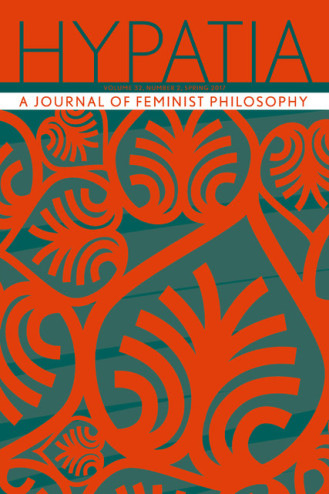 What an [En]tangled Web We Weave: Emotions, Motivation, and Rethinking Us and the “Other” in Hypatia. Book Symposium on Lori Gruen’s “Entangled Empathy” (View Article) (View Full Symposium)
What an [En]tangled Web We Weave: Emotions, Motivation, and Rethinking Us and the “Other” in Hypatia. Book Symposium on Lori Gruen’s “Entangled Empathy” (View Article) (View Full Symposium)
In Entangled Empathy, Lori Gruen offers an alternative ethic for our relationships with animals. In this article, I examine Gruen’s account of entangled empathy by first focusing on entangled empathy’s relation to the moral emotions of sympathy, compassion, and other emotions. I then challenge Gruen’s account of how entangled empathy moves us to attend to others. Lastly, and without intending to place humans at the center of the conversation, I reflect on the ways entangled empathy can help us solve some human problems—particularly the racial divide in the United States.
 The Color and Content of Their Fears: A Brief Analysis of Police Brutality in Radical Philosophy Review. Book Symposium on Naomi Zack’s “White Priviledge and Black Rights”. (View Article) (View Symposium)
The Color and Content of Their Fears: A Brief Analysis of Police Brutality in Radical Philosophy Review. Book Symposium on Naomi Zack’s “White Priviledge and Black Rights”. (View Article) (View Symposium)
In response to Zack’s “White Priviledge and Black Rights”, I consider her account of the hunting schema in light of police violence against black women. I argue that although Zack provides us with a compelling account of racial profiling and police brutality, the emotional aspect she attributes to the hunting schema is too charitable. I then claim that Zack’s hunting schema fails to account for state violence against black women and in doing so she only tells a partial story of comparative injustice as it relates to police brutality of blacks.
ACADEMIC ANTHOLOGIES
Forgiveness Exemplars and the Oppressed in Kathryn Norlock’s (ed) The Moral Psychology of Forgiveness. Rowman and Littlefield. (Forthcoming) Penultimate Version More Info
In this chapter, I argue that while moral exemplars are useful, we must be careful in our use of them. I first describe forgiveness exemplars that are often used to persuade victims to forgive such as Nelson Mandela, Martin Luther King Jr., and Jesus of Nazareth. I also explain how, for Kant, highlighting these figures as moral exemplars can be useful. I then explain two kinds of rhetorical strategies that are used when attempting to convince victims to forgive. Last, I explain (a la Kant) how the use of exemplars does not empower but instead disempowers victims. My overall claim is that using exemplars to persuade victims to forgive is problematic. It is best if we rely on decisive reasons to forgive instead of focusing on people who have forgiven.

“State Racism, State Violence, and Vulnerable Solidarity” in Oxford University Press Handbook of Philosophy and Race. Ed. Naomi Zack (January 2017) (View Chapter)
My chapter examines how criminal justice policies, and laws are a hidden form of anti-black racism. In other words, I will examine how state racism and state violence is sustained. I will also explore how the law creates a “subRace” out of those society fears and have contempt for. This not only leaves black Americans vulnerable but it also transforms those who are different or new (transgender, mentally ill, the undocumented, and the poor) into the “new black”, a group who like their black counterparts, will remain marginalized as a fact of law. In doing so, I aim to show that a way to fight this form of racism is to not only create a solidarity among the oppressed members of the subRace but to also take a proactive approach toward the law and the criminal justice system. This entails a reimagining of what 21st century political power must look like for Black, Brown, and other oppressed bodies.
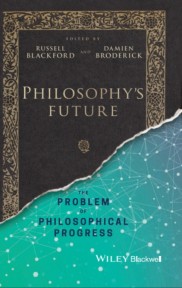 “Coming Out of the Shade” in Philosophy’s Future: The Problem of Philosophical Progress. Damien Broderick and Russell Blackford (Eds.). Wiley-Blackwell (April 2017) (View Chapter)
“Coming Out of the Shade” in Philosophy’s Future: The Problem of Philosophical Progress. Damien Broderick and Russell Blackford (Eds.). Wiley-Blackwell (April 2017) (View Chapter)
I claim that professional philosophers need to seriously rethink how they do philosophy, where they do philosophy, and with whom they do philosophy. My suggestion is that they “leave the shade” of their philosophical bubbles by making their work accessible to each other and to the public and by engaging with thinkers outside of philosophy. I argue that if philosophers do not “leave the shade,” we may witness the decline and even the eradication of the field of philosophy, as we know it.
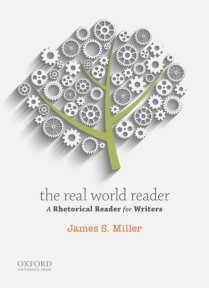 “Twitter Trolls and the Refusal to be Silenced”, in James S Miller’s The Real World Reader. 1st. Edition. Oxford University Press (View Chapter)(Order Book)
“Twitter Trolls and the Refusal to be Silenced”, in James S Miller’s The Real World Reader. 1st. Edition. Oxford University Press (View Chapter)(Order Book)
When we find ourselves arguing with another person face-to-face, we can generally rest assured that our conflict won’t rise beyond a certain threshold. But what happens to such restraint when our arguments go online? Under the Web’s protective cloak of anonymity, many speak to others in ways that mislead, mock and malign. Taking aim at one of the key examples of this trend, I share my thoughts about the growing threat of “Twitter trolling.”
PHILOSOPHY AND POP CULTURE
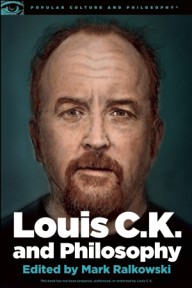 “If You’re Not White, You’re Missing Out and Other Thoughts on Privilege”, in “Louis C.K. and Philosophy. Open Court (April 2016) (View Chapter) (Order Book)
“If You’re Not White, You’re Missing Out and Other Thoughts on Privilege”, in “Louis C.K. and Philosophy. Open Court (April 2016) (View Chapter) (Order Book)
Comedian Louis C.K. brilliantly reveals to us the reality of race, racism, and privilege–from a white male perspective, under the genius of comedic rhetoric, perfect timing, and societal truth. Instead of sounding like he is trying too hard to be an ally to blacks, or an anti-racist whose mission is to transfer white guilt to his white audience, Louis’s comedy instead, makes us laugh, but makes us think and see at the same time. In this chapter, I provide a descriptive analysis of Louis C.K.’s account of privilege. I then argue that he leaves the prescriptive account– the what to do about white privilege and how to do it- up to us.
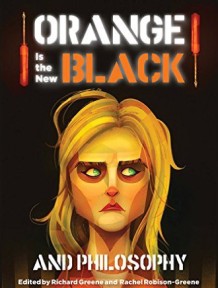 “Who’s Messing With Your Mind” in Orange Is the New Black and Philosophy ed. by Richard Greene and Rachel Robison. Open Court (Sept. 2015) (View Chapter) (Order Book)
“Who’s Messing With Your Mind” in Orange Is the New Black and Philosophy ed. by Richard Greene and Rachel Robison. Open Court (Sept. 2015) (View Chapter) (Order Book)
In this chapter, mixed with moral psychology and ethics, I explore the topic of manipulation by analyzing “Orange Is The New Black” season two antagonist, Yvonne “Vee” Parker. I claim that Vee is a master manipulator. I begin by laying out several definitions and features of manipulation. Definitions include covert influence, non-rational influence, the effect of non-rational influence, and intentionally making someone or altering a situation to make someone succumb to weaknesses. Features include trust, deception, emotion, false belief, and vulnerability. I argue that although philosophers (Anne Barnhill, Robert Noggle, and Colin McGinn) are divided on what manipulation is because not all definitions and features fit all cases, I claim that Vee’s actions fit them all. I then attempt to explore what is bad and possibility good about manipulation. I examine if excellence alone is what makes manipulation good or should we take into consideration the autonomy denied the listener, the vices employed, and the bad consequences that arise from manipulation. I conclude with offering up suggestions on how one can guard themselves against manipulators.
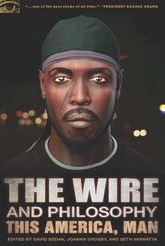 “Stop Snitching, Stop The System” in The Wire and Philosophy ed. by Vanatta, Crosby, & Bzdak. Open Court. (June 2013). (View Chapter)(Order Book)
“Stop Snitching, Stop The System” in The Wire and Philosophy ed. by Vanatta, Crosby, & Bzdak. Open Court. (June 2013). (View Chapter)(Order Book)
In The Wire and Philosophy selected philosophers who are fans of The Wire tap into these conflicts and interconnections to expose the underlying philosophical issues and assumptions and pursue questions. In “Stop Snitching, Stop the System,” I argue that law abiding citizens do not cooperate with the police because of the rampant state violence they witness and the police’s blatant disregard for their lives. I argue that the refusal of law abiding citizens to snitch to the police against neighborhood criminals is ‘non-cooperation’ and this non-cooperation is an act of political resistance.
